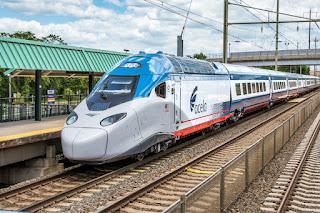Looking back on the last year, there was good news and bad on the transportation front here in Connecticut. Here’s my Top Five list:
DEATH ON THE HIGHWAYS: This may prove to be the deadliest year
ever on Connecticut highways. Excessive
speeding and, until recently, lax enforcement by State Troopers, is blamed for
much of the carnage. And wrong-way
crashes on our parkways and interstates only accelerate the toll, many of those
tied to impaired drivers.
Also heading for a new record,
pedestrian deaths, also blamed on speeding, reckless driving and jay-walking.
NEW STAMFORD GARAGE: Months late but on budget, the new rail
station parking lot finally opened in February, bringing 900+ parking spaces to
would-be commuters on Metro-North… and a few non-riding neighbors.
The new Stamford Garage
Initial estimates in 2006
pegged the cost of the garage at $35 million.
By 2012 the cost had jumped to $85 million. Final cost (bonded by the state), was $100
million. The parking lot has proven
popular both with commuters and local workers who find it cheaper than nearby
private lots.
Now that the old garage has
been demolished it remains to be seen how CDOT will repurpose that land, just
steps from the always-busy train station.
NEW LOCOMOTIVES FOR METRO-NORTH: Good news is coming down the tracks for riders on the Danbury, Waterbury and Hartford lines: shiny new, dual-mode (electric and diesel) locomotives are coming online in the next two years. Faster and cleaner (even running on diesel), the new power units will cost $15 million each.
JUST ONE
MORE LANE SHOULD FIX OUR TRAFFIC: That’s a familiar comment by drivers, especially on the
always-busy section of I-95 in Stamford, ranked as one of the worst traffic
spots in the US. And sure enough, CDOT
is adding an additional “operational” lane for traffic getting on and off the
highway downtown. Cost of the project…
$76 million and hundreds more hours of construction delays.
REBUILDING THE NORWALK BRIDGE: When a fiery truck crash on I-95 last
May almost melted
the Fairfield Ave bridge in Norwalk, initial estimate were that demolishing
and replacing it would take a year. To
their credit CDOT and the (no-bid) contractor demolished the old structure in
just 80 hours and finished the new bridge in seven months and millions under
budget. Well done. But none of this would have been necessary
had the accident never happened.
BUT STILL UNDELIVERED: Amtrak’s long-promised new fleet of
Acela “Avelia Liberty” trains were supposed to go into service in 2021. Then they were promised to be in service this
year. Now the estimates are that they’ll
be running in “early
2025”.
Acela's new Avelia Liberty
And we are still waiting for
the $1 billion replacement of the 127 year old Walk
bridge in Norwalk on the Metro-North / Amtrak line to really get
going. That contract was awarded in 2017
but work didn’t begin until 2023 and won’t be finished until 2029.
Meanwhile in downtown Hartford,
replacement of the I-84 viaduct has been debated
since 2010. Whether the old highway
will just be rebuilt, sunken or turned into a tunnel capped with a park has yet
to be decided. Once a plan is finalized
the project will take 15 years and cost something like $17 billion.
So as they say… “stay tuned
for further updates”. And Happy “News”
Year.







